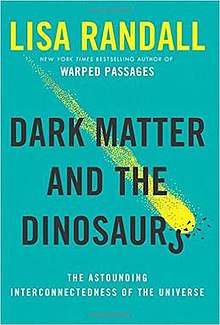Dark Matter and the Dinosaurs
Dark Matter and the Dinosaurs: The Astounding Interconnectedness of the Universe is a 2015 non-fiction book by Harvard astrophysicist Lisa Randall. Randall conjectures that dark matter may have indirectly led to the extinction of dinosaurs. Other scientists generally regard this as a credible hypothesis but note a lack of supporting evidence. The book itself was well reviewed.
 Hardcover edition | |
| Author | Lisa Randall |
|---|---|
| Country | United States |
| Language | English |
| Subject | Cosmology |
| Genre | Non-fiction |
| Publisher | Harper Collins: Ecco Press |
Publication date | 27 October 2015 (Hardcover) |
| ISBN | 978-0-06-232847-2 (Hardcover) |
| Preceded by | Higgs Discovery |
Overview
Randall hypothesizes a plane of dark matter exists roughly on the plane of the Milky Way galaxy.[1] As the Sun oscillates in its orbit around the center of the galaxy, it passes through the dark matter. The resulting gravitational disturbances destabilize bodies in the Oort cloud, resulting in increased Earth impacts, such as the one that caused the Cretaceous–Paleogene extinction event resulting in the extinction of dinosaurs.[2][3] Formation of a plane requires that a fraction of the dark matter have different properties than the bulk of it, described by Randall as "dissipative dark matter"[4] in a paper co-authored with Harvard physics professor Matthew Reece.[5] Randall's hypothesis is similar to the Nemesis theory, which postulates that a currently unseen brown dwarf star orbiting the Sun is the cause of the periodic impacts.[6]
Criticism
Astrophysicist Mario Livio of the Space Telescope Science Institute, while noting the idea is interesting, states the evidence is "far from compelling".[4] Astrophysicist Coryn Bailer-Jones of the Max Planck Institute for Astronomy and physicist Adrian Melott question the statistical analysis used to determine the periodicity of impacts, with Jones also noting impacts could be from asteroids rather than objects originating in the Oort cloud.[4] Physicist Konstantinos Dimopoulos offers that a proposal from a world-renowned cosmologist is certainly credible, but notes the "need to make dark matter weirder than it already is" violates Occam's razor. Randall rebuts such criticism by noting that it could be "simpler to say that dark matter is like our matter, in that it's different particles with different forces", adding "the other answer is that the world's complicated, so Occam's razor isn't always the best way to go about things."[7]
Critical reception
Jim Al-Khalili, in a Wall Street Journal book review, describes the book as "a cracking read, combining storytelling of the highest order with a trove of information" on the underlying science.[2] Film critic Joe Morgenstern, in a review of film The Good Dinosaur, says the book is a "splendid source" regarding dinosaur extinction, saying it "ranges far and eloquently through our current knowledge of the universe".[8] Maria Popova, writing for The New York Times, was less enthusiastic, saying while Randall is not one of the few "working scientists who are also enchanting writers", she is "an excellent explainer" with an "infectious" affection for the subject matter. Popova notes the idea, due to a lack of confirming physical evidence, is "essentially a thought experiment", and that the book's "greatest reward" is actually "the gift of perspective".[9]
See also
References
- Freeman, David (26 October 2015). "This Physicist Says Dark Matter May Have Killed Off The Dinosaurs". Huffington Post. Retrieved 12 December 2015.
- Al-Khalili, Jim (9 December 2015). "The Science of Shooting Starts". Wall Street Journal. Dow Jones & Company. Retrieved 12 December 2015.
- Brean, Joseph (12 December 2015). "Dark matter and the dinosaur: New theory challenges notions on origins of human life". National Post. Retrieved 12 December 2015.
- Gibney, Elizabeth (7 March 2014). "Did dark matter kill the dinosaurs?". Nature. Retrieved 12 December 2015.
- "Faculty: Matthew Reece, Assistant Professor of Physics". Harvard University. Retrieved December 11, 2015.
- Dimopoulos, Konstantinos (10 December 2015). "Did 'dark matter' or a star called Nemesis kill the dinosaurs?". The conversation. Retrieved 12 December 2015.
- Temming, Maria (1 November 2015). "Did Dark Matter Kill the Dinosaurs? A Q&A with Author Lisa Randall". Scientific American. Retrieved 12 December 2015.
- Morgenstern, Joe (25 November 2015). "'The Good Dinosaur' Review: A Warm-Blooded Jurassic Lark". Wall Street Journal. Dow Jones & Company. Retrieved 12 December 2015.
- Popova, Maria (24 November 2015). "'Dark Matter and the Dinosaurs,' by Lisa Randall". The New York Times. Retrieved 12 December 2015.